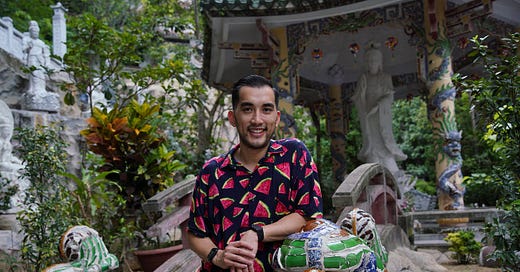I’m moving (back) to Southeast Asia.
In 2025, I plan to:
Base my business out of Singapore.
Live and work from 3–4 countries in the region.
Reposition my offer to focus on Southeast Asia.
Here are the reasons why.
The Future of Work
I’ve been obsessed with this idea.
We are living in a time where it’s:
Never been easier and cheaper to start a business.
Connect with anyone in the world with an internet connection.
The best part?
You don’t need any permission.
The future of work is decentralization.
You can learn anything on the internet.
You can earn any amount on the Internet.
Schools won’t teach the skills needed for income beyond traditional jobs.
Traditional jobs won’t pay you for the value you create but the time you offer.
In short,
The wealth you create outside a job relies on knowledge not taught in school.
MBAs are a complete waste of time.
Why spend six figures to earn a piece of paper that teaches you the theory of business when you can start a business for $0 and earn immediately?
Our concept of ‘work’ is changing rapidly.
The rise of decentralized work means you no longer need to live in high-cost cities like New York or Melbourne.
Southeast Asia is uniquely positioned to benefit from this shift with its fast internet, lower costs, and existing communities of creators and solopreneurs.
The future is here. It’s just concentrated in a few places.
But what does this have to do with Southeast Asia?
That’s a good question.
From a relative point of view, Southeast Asia is still underdeveloped but growing rapidly, with a median age below 30.
Most of the Western world is stagnating.
Aging population.
Low to no growth in GDP growth.
This is the inverse in Southeast Asia.
We have a situation where:
This young population was raised with the internet, so they are digitally literate.
They have spent their entire lives consuming internet content, so they understand the creator economy.
They see people like them making money online doing what they love, so they question whether they can do this too.
As internet penetration continues across the region, more and more Southeast Asian young people will see the internet as a vehicle for growth and a career.
In Southeast Asia alone, there are:
Durians.
482 million Internet users.
Mostly on their smartphones.
Who spend at least 2 hours on social media.
The creator revolution will be in Southeast Asia.
Southeast Asia is set up for the creator economy
I’ve been in Southeast Asia for over 120 days.
During this time, I’ve lived and worked from:
Singapore
Indonesia (Bali)
Vietnam (Da Nang & HCMC)
All these countries are set up for digital nomads, solopreneurs, and creators.
Every cafe has wifi, comfortable chairs, and power points.
There’s a cafe in Bali called Zin, where they have accommodation, a co-working cafe, spin and pilates classes, and a gym all within the same complex.
You never have to leave.
They actively encourage people to work from their laptops and spend the whole day ordering coffee and food.
Combined with the lower cost of living, this will attract more creators to base themselves outside the region.
Many countries like Thailand now offer long-term visas of 5+ years for digital nomads to live and work from there.
They have a progress mindset.
I can’t do this from Australia or Europe.
Most cafes don’t like you staying there for too long, and many aren’t set up with good Wi-Fi and power points.
The infrastructure and mindset are already in Southeast Asia.
This is personal for me.
I am Southeast Asian.
My family is from Singapore. I was born there. I’m ethnically Chinese with Malay roots. My grandmother is Peranakan.
I was raised in Australia for most of my life.
But I always felt disconnected from my cultural and ethnic identity. Being in the Southeast Asia region means more than just business.
I often struggled to answer the question:
‘So, where are you from?’
I never really had an answer to that question.
Moving back to Southeast Asia feels like a journey to rediscover who I am and where I belong.
I want to learn Mandarin and Bahasa Indonesian.
There is a growing population of 2nd and 3rd generation immigrants who are going back to their country of origin.
I saw it in Vietnam and Indonesia.
Naval Ravikant says the 3 most important decisions are:
Who you marry.
What do you do for work.
Where you live.
You make these decisions, and then these decisions make your life.
For me, I’m not looking to marry until 35 or later.
I’ve spent a lot of time thinking about my work.
Now, I’m focusing on where I want to live.
If you don’t actively decide this, it will be decided for you.
What choices are you making?
I’m not just moving to Southeast Asia
I’m placing my bet on the future of work.
How?
Physically locating myself in the region.
Setting up my business in the region.
Building a regional community.
Reconnecting with my roots.
I’ll see in 12 months if my bet was right.
👉 I’ve previously sold a one-person business and I’m in the process of scaling another one to $20k per month. If you want my one-person business growth system, I’ve created a FREE email course for you to get started.






Loved this article. Thank you 🙏🦋
Low to no growth in GDP—I can confirm this, as I’m from Europe. However, there is a consolidated younger generation that is dynamic and accounts for the largest share of consumption.
Do you think writers and creators from other countries can achieve "success" in South Asia despite cultural differences?